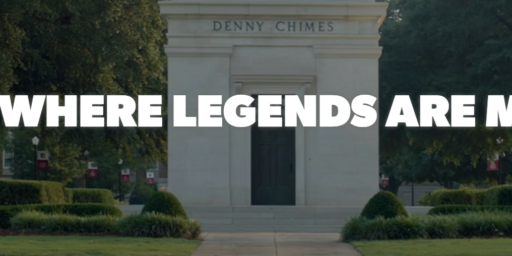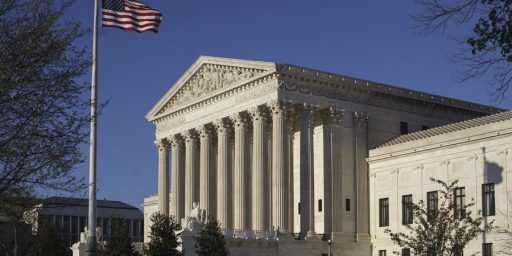Illegal Immigrants Create Community College Controversy
North Carolinians are up in arms over a statewide community college policy that allows illegal immigrants to attend community colleges at out-of-state tuition rates:
A recent legal memo from the North Carolina Community College System office broadening the definition of “open door” admissions sparked a firestorm across the state. Citing a 1997 state attorney general opinion that “denies colleges the authority to ‘impose nonacademic requirements on admissions,'” David J. Sullivan, assistant to the president for legal affairs for the system, wrote to the leaders of the 58 community colleges that, “notwithstanding any policy of the local board, colleges should immediately begin admitting undocumented individuals” as out-of-state residents.
Many states are debating rules about in-state tuition rates for such students, but the North Carolina fight is over the right to enroll at all — even at full price. The system memo followed the revelation that 21 of the colleges were barring illegal immigrants, at least as of the last statewide count in 2005. The varying policies are the result of a 2004 state system memo that left the question up to local colleges.
The new directive has become political dynamite in the state, with the five leading Democratic and Republican candidates for governor condemning it within days of when it became public last week, and residents flooding the phone lines of their political and college leaders. “The directive issued by the North Carolina Community College System to mandate all community colleges across our state admit illegal immigrants as students simply ignores our immigration laws. If we ignore these laws, what other laws should we consider as unnecessary to obey?” State Senator Fred Smith, a Republican candidate for governor, said in his statement.
Meanwhile, the current governor, Michael F. Easley, a Democrat, defended the practice of admitting undocumented students who qualify and pay out-of-state tuition rates. And Martin Lancaster, the system president, released a statement Monday emphasizing the community colleges’ inclusive missions and stressing that the affected students, mostly brought to the United States by their parents as children, did not make the decision to come to the country illegally and most likely won’t be returning to their nations of origin. “To deny a significant portion of tomorrow’s workforce any higher education opportunities will not only hurt these young people who came to North Carolina through no fault of their own, but it will also significantly diminish their incomes forever. The consequences to North Carolina are reduced tax collections and potential payments for social services and incarceration long into the future.”
I can see the argument for excluding illegal immigrants from receiving driver’s licenses, as they are de facto national identity documents and a gateway document (along with an easy-to-forge social security card) to employment eligibility, and I generally agree that in-state rates should be reserved for legal residents of the state in question, or legal residents of neighboring states, if a tuition exchange program is in place, but I’m not sure what public benefit there is to barring illegals from attending community colleges at out-of-state tuition rates–particularly when the out-of-state tuition rate is over $2,000 more per year than the actual cost of educating students, in effect creating a subsidy for legal state residents who attend those same colleges. And certainly college admissions officers have better things to be doing than checking the identity papers of every applicant and conducting legal residency checks on every person who wants to take a course at their college.






[parody]Chris, you’re being naive. Don’t you realize that it is the PATRIOTIC DUTY of EVERY red-blooded American to keep them furriners out of this country? Don’t you go believing those illegals and their sob stories about just wanting to find a better life for themselves and our families! All they REALLY want is to take our jobs, steal our women, and make California and Texas part of Mexico!
It is imperative that all Americans make sure that those darn illegals don’t go to college! What’s next? They might start appreciating American culture? Assimilate into our society? Teach Taco Bell what a burrito is actually SUPPOSED to taste like? Improve their language skills! Demand the right to vote? Why, that’s just plain un-American!
Clearly the scourge of educated people contributing to our culture, society and economy must be stopped at all costs! After all, these people DID break an unjust set of mostly unenforcable laws, just like the Italians and Irish before them, and look what happened with those fellas![/parody]
The Piedmont states, never famous for welcoming outsiders as new residents, have had an enormous influx of new immigrants over the last ten to twenty years. They’re being blamed for everything from the decline of the textile industry to increased crime to changes in the environment.
How many of the critics are the same people who complain that illegal immigrants are living off welfare payments and other free services? Do these critics understand the nature of out-of-state tuition? I don’t know about community colleges, but at least at state four-year and research-level universities, these people are often a cash cow.
Indeed, you hit on a broader part of the immigration debate that I think gets ignored in terms of policy implementation: it is easy to say that X benefit or service ought to be only for legal residents/citizens but the fact of the matter is, most of these institutions don’t have the capacity to confirm this information and most of us don’t run around with proof of citizenship on our persons.
Any policy that would require a service provider to only give benefits to legals would have to have a mechanism to confirm the status of all service-seekers. That is an added cost to the institution and perhaps to taxpayers and/or legitimate service-seekers.
Further, if we really want to have services provided only to legals, we really need a national ID card. Last time I checked, that was a non-starter.
At a minimum, any process that requires proof of legality will ultimately inconvenience the vast, vast majority of us who are legal.
(And by “service” I don’t just mean government services. There was an attempt in Georgia, for example, to stop illegals from sending money home by having grocery stores and other which wire money to confirm the legal status of the service-seekers).
Let’s shift the argument a bit. Let us assume that the colleges had a policy that prohibited those who have outstanding warrants from attending classes.
All of the comments about letting these people have access to higher education and thus the benefits of opportunity would apply. But there is still the problem that these people have an outstanding issue with the law.
When I went to college (back at the dawn of time as my children will tell you) the university had a policy that prohibited you from signing up for the next semester if you had any outstanding traffic tickets. There was a challenge to it that such a policy amounted to a presumption of guilt on the offense, so it was changed to you needing to either have the tickets resolved, be currently pursuing your legal options to have the tickets dismissed or be within the grace period between the offense and when you have to either plead no contest/pay the fine or challenge the ticket.
In short the university policy was geared to not allow continued enrollment by those who had on going criminal legal issues. Now this was much more petty legal issues and had much more to do with the university trying to bring order to the chaos of tens of thousands of students and limited parking spaces. But the principle is the same.
Why should the colleges be forced to accept people who have a problem with the law. Should they also be forced someone who is wanted on outstanding warrants for rape? An employer who hires an illegal alien is subject to fines. Why should a college be forced to accept an illegal alien.
What this comes down to is a question of respect for the law. It may be like prohibition that you have a law sufficiently unpopular and unenforceable that it needs to be repealed. I will leave that question to the public debate on what we do about current, past and future illegal immigration. But while it is the law, saying that we will identify one class of crime to be ignored by officials is not the answer.
I have no objections to illegal immigrants attending community college at out of state rates provided that they aren’t keeping other students who are legal immigrants or citizens from attending, and they aren’t using financial aid.
But I see no real problem if they are footing the bill.
I side with the “keep ’em out crowd”. If the logic is that they are already here illegally, we might as well get the most tax revenue out of them…well, what that comes down to is that any law can be broken if the price is right.
If we raise the driver’s license fee to say, $900- is it then OK to give them one if they can pay it?
For the person spewing about illegal acts and existing warrants. Since it is a bit easier to search these databases and some students were murdered by other students (not immigrants), this is now required in NC.
Also, the previous post on immigrants in NC since the 70s, are you speaking of those from the north (but in the borders) or those from the south (outside the borders).
The whole issue of enforcement is rather overblown. All the college has to do is ask for birth records, social security cards and immunization records. Now that is not a full proof way of proving citizenship, but it makes it that much more difficult for illegal immigrants to fit in. They are then faced with a choice of either going away or breaking more laws. If they chose to break more laws by committing forgery and fraud then we get a better look at what kind of people they are then don’t we.
I wonder what the tuition is for international students?
I have a young Canadian friend who can’t afford to attend one of our local colleges because 1. she can’t afford the visa. 2. if she could afford the visa it would still take forever, 3. she has to prove that she has the huge tuition fee up front. And I assure you it is far more than my son’s tuition, who is local and far more than out-of-state tuition.
How is that fair to those who play by the rules?
And how does it behoove a local college to bend the rules for some but not for others?
I’m all for immigration. And I’m for reasonable immigration laws. But I must admit I have a hard time with the rationalization that those who do abide the rules (fair or not) get the short end of the stick, while those who don’t play by the rules get rewarded.
Just don’t give them a diploma, since any contract entered into, which involves breaking the law, is not legally enforceable.
WTF?
Where is the line in the sand? How many f#$%$#g laws do they have to break before we say enough is enough?
I kind of have to agree with you there. If a kid is academically-qualified to attend a college, is physically-present in the U.S., and able to pay “full freight” on the tuition, then as long as they keep their noses clean and stay out of trouble, I don’t think they should be kept out of schools. Somehow, someday, we’re going to have a reasonable and prudent policy on how to deal with the millions of illegal aliens in this country. In the meantime, it’s not in our own best interests as a population to keep children “in the shadows.” They need to be part of the public health picture and receive the necessary vaccinations; and that goes hand-in-hand with making sure they get a decent primary and secondary education. It’s in no one’s interest that by our own policies we foster an uneducated (or potentially diseased) underclass in this country.
And if they’ve got the academic chops and aren’t displacing a citizen or legal resident who’s equally or better qualified, I think they shouldn’t be barred from post-secondary education either, so long as they don’t depend on public assistance or financial aid to which they aren’t entitled.
I’ve quoted you and linked to you here.
“I have a young Canadian friend who can’t afford to attend one of our local colleges because 1. she can’t afford the visa. 2. if she could afford the visa it would still take forever, 3. she has to prove that she has the huge tuition fee up front. And I assure you it is far more than my son’s tuition, who is local and far more than out-of-state tuition.”
@ lunacy,
An F-1 student visa costs a $100.oo non-immigrant visa application fee; the application forms themselves are free and available online, and two visa photos are under $10 most places. Affording the visa should be the least of a prospective international student’s financial burdens.
“An F-1 student visa costs a $100.oo”
Except for the requirement that she has “Financial evidence that shows you or your parents who are sponsoring you have sufficient funds to cover your tuition and living expenses during the period of your intended study”
If you have the money to send your child “abroad” to college, you certainly should have the means to prove that you can pay for the tuition semester.
Otherwise, getting a degree in your own country will have to suffice. Do we need another welfare program for international students?
Who the hell is sending a child abroad to school.
A young lady wants to move south and attend school!
In my circle, parents don’t send children. Young adults go where they can.
And I’m not suggesting there be a welfare program for my young friend. I’m suggesting that is isn’t fair that she and others like her who play by the rules can’t attend at out of state or in state rates. Yet, an illegal may be able to.